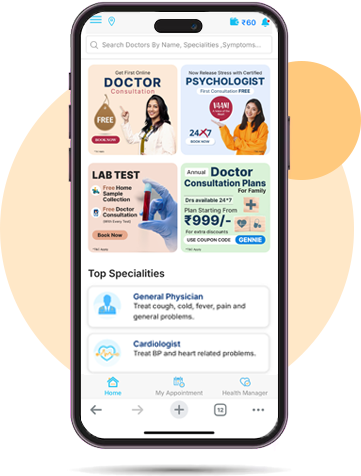Why Mental Health is Just as Important as Physical Health
October 10 , 2025

In today’s fast-paced and achievement-driven world, we often hear about the importance of physical fitness - exercising regularly, eating right, and going for routine checkups. Yet, one crucial aspect of well-being often remains in the shadows: Mental Health. While physical health keeps the body strong, emotional health keeps the mind resilient. Both are deeply connected and equally vital for living a balanced, fulfilling life.
Let’s explore why mental health deserves the same attention, care, and priority as physical health and how the two together create a foundation for true wellness.
♦ Understanding Emotional Health
Emotional health is the capacity to recognize, manage and express emotions in a healthy, constructive manner. This isn’t just about what it means to be happy, but how well we cope with those challenges of life, the emotional highs and lows, feelings of despair or loss - all the things that provide our lives with texture. A person who is emotionally healthy is able to:
- Identify and deal with their feelings in a healthy manner.
- Learn to cope with the stress, loss or disappointment.
- Keep up your self-pride and your self-confidence.
- Develop and maintain quality relationships with others.
Just as the body is nourished by food and exercise, the mind is nourished by self-awareness, empathy and resilience.
♦ The Mind–Body Connection: How Emotions Can Affect Physical Health
There is a stronger mind-body link than most people quite realize. Good emotional health does not only make us feel better psychologically; it is also connected to good physical health.
- Stress and the Body
Chronic stress produces a cascade of cortisol and adrenaline hormones that, over time, can increase blood pressure, suppress the immune system and cause digestive problems as well as heart disease. Those who have difficulties controlling emotions such as anger, anxiety or sadness may be more prone to these physical symptoms.
- Sleep and Recovery
Disturbances of emotion commonly cause sleep disruption. Anxiety can contribute to insomnia; depression may result in oversleeping. And poor sleep, in turn, affects metabolism, mood regulation and overall energy - a vicious cycle.
- Immune System Impact
Grief suppresses the immune system. It turns out that people with chronic anxiety or depression are more prone to infections and illnesses, studies show. Emotional well being enhances the body’s innate ability to heal and ward off illness.
- Lifestyle Choices
When feelings run amok, people may resort to unhealthy responses - overeating, smoking or drinking and all of these undermine physical health directly. It is simply that mentally healthy people take care to make positive lifestyle choices.
♦ Mental health is not just a matter of personal happiness
It has a direct impact on performance and productivity in a professional or academic environment. A balanced mind is always one of the top priorities you have to retain in your workplace as well and school. Happy people are always associated with good work or academic performance. The following are the benefits of emotional health :
- Focus and clarity: A calm assured character can concentrate and be productive and can make clearer decisions.
- Creativity: Emotional stability triggers creativity and other innovative thinking that become vital.
- Relationships at work: You can be more empathetic and improve teamwork and make a friend at work.
- Resilience: You can handle pressure at work and can bounce back from failure .
In today's corporate world, it is not just enough to provide a gym room for employees or students for physical wellness organizations realizing employee wellness programs are not complete without an emotional focus. Happy, healthy employee creates more positive, competitive, and productive workplaces/faculty.
♦ What Fractured Mental Health Looks Like
Unlike the physical ailments, it is not always apparent when a person is facing emotional health issues. Still, they do present themselves in subtle and occasionally severe symptoms like :
- If you are persistently tired and unmotivated
- Irritability or mood swings
- Withdrawal from social connections
- Difficulty concentrating
- Appetite or sleep disturbances
- Feelings of hopelessness or worthlessness
No person should ignore those signs, as left untreated, they lead to more serious conditions such as anxiety disorders, depression or full burnout all of which have long-term consequences on life at both work and home.
♦ Value of Emotional Health Validation
For decades we’ve treated physical ailments as “real” and emotional struggles as “personal weaknesses.” Due to this stigma many have suffered or died avoiding treatment. But modern science and psychology have shown that emotional health is not secondary, it's foundational.
Here’s why:
- Emotional Pain Is Just as Debilitating as Physical Pain
Emotional pain can be as real and severe as physical pain. Heartache, grief and chronic stress can be just as debilitating as physical injuries. Scientific studies of the brain have revealed that it treats emotional pain in much the same way as physical pain.
- Healing Is Holistic
A sound mind in a healthy body. A person can never be healthy without peace of mind. Emotional healing speeds up the healing of physical illness and after surgeries, whereas emotional trauma that doesn’t heal can drag on or exacerbate longstanding pain.
- Prevention Is Better Than Cure
Just as we exercise to avoid physical breakdown, nurturing emotional health prevents mental breakdown. In the same way that moderate diet and exercise serve as “preventive care” for the body, checking in with yourself regularly about the state of your emotions or going to therapy or practicing mindfulness can be emotional preventive care.
- You Need to Feel Good To Have a Great Relationship
Good emotional health allows us to relate to others and communicate with them effectively.
♦ Building and Maintaining Mental Health
Just like your physical health, good mental health takes work. The following are some workmanlike steps to start with to set about building and maintaining it:
- Self-Awareness
Simply knowing you feel something and why is often the key towards emotional equilibrium. Keeping a diary, reflecting on the events of the day and practising mindfulness meditation can also help boost our sense of self-awareness and emotional clarity.
- Positive Relationships
People who look up to you, people who listen to you and people who support you. The ability for human contact to be a tremendous emotional medicine is so profound.
- Healthy Expression
Burying emotions causes stress and anxiety. Practice sharing feelings constructively whether by talking to a trusted friend, spouse or partner; writing or other creative processes such as art and music.
- Regular Physical Activity
Exercise lets loose endorphins - the body’s own natural mood lifters. It’s easy to do and offers stress relief, mental clarity and a host of physical benefits.
- Balanced Lifestyle
Emotional health is based not just on the absence of stressors, but proper sleep, good food and time to relax. And failing these foundations usually results in irritability and weak mental resilience.
- Seek Professional Help
There is no stigma in therapy/counseling. Just as you might call a doctor for body pain, mental health practitioners help guide you through tough emotions.
- Mindfulness and Meditation
Mindfulness draws attention to the present, quiets anxiety and quiets overthinking. The discipline of yoga facilitates emotional regulation, better focus, and a calmer spirit through regular practice.
♦ Societal and Workforce Factor
But the discussion about emotional health shouldn’t be confined to individuals. Society, our schools, and organizations also need to have a part.
- In Schools
The percentage of 4 year olds who can rely on themselves, children should be taught about emotional intelligence early - how to handle anger, failure and empathy. Mental health education should be as important as math or science.
- In Workplaces
Employers should be having frank discussions about stress and burnout. Offering counseling, flexible schedules and wellness programs enables employees to keep emotionally centered.
- In Communities
Societies do well when people help each other out or provide emotional support. Community and social programs, awareness campaigns, and community support groups which foster an environment of caring.
♦ Breaking the Stigma
Stigma is one of the greatest obstacles to emotional health. People do not want to be judged or misunderstood if they let on that they might have emotional difficulties. It’s this stigma that we need to overcome by speaking out, caring and educating.
We must remember:
- It is not a weakness to have mental health issues.
- Asking for help is a sign of strength.
- Emotional health is everyone’s responsibility.
The way we have normalized that taking medicines is for a fever, we should normalize talking to a therapist as treatment for anxiety and stress.
♦ Balancing Both: The Complete Wellness Approach
True well-being is a balance between body and mind. Think of it as two sides of the same coin:
| Physical Health | Emotional Health |
| Exercise and movement | Mindfulness and reflection |
| Balanced diet | Positive mindset |
| Medical check-ups | Therapy or self-care |
| Rest and recovery | Emotional expression and connection |
| Avoiding toxins | Avoiding toxic environments or relationships |
When both aspects are nurtured together, they reinforce each other. A healthy mind motivates the body to stay active; a healthy body empowers the mind to stay strong.
♦ Conclusion: A Call for Balance
In a world consumed by appearances, fitness trackers and diet trends, it can be easy to forget that emotional health is just as if not more crucial. You can’t really shine on the outside if you’re shattering inside.
Looking after your mental wellbeing involves:
- Listening to your feelings.
- Asking for help when needed.
- Allowing yourself rest and compassion.
- Without mental health there is no health, as the saying goes.
So let’s see if we can treat our emotional well-being with the attention and priority we give our physical health because when mind and body are working together, that is truly where the pursuit of health begins.











